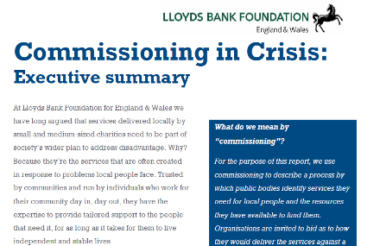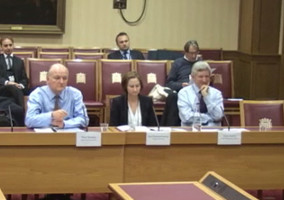Current commissioning processes are a “major threat to the survival of smaller charities” and are failing at every level, according to a new report by Lloyds Bank Foundation.
The report, entitled Commissioning in Crisis, brings together the “experiences of small charities” who took part in 120 tenders. The foundation says it “shines a spotlight on a catalogue of errors and unacceptable hoops small charities are forced to jump through to be able to continue supporting local people in need”.
The report said that “the demise of grants and rise of contracts” has resulted in a shift in government funding from “smaller, more local charities towards ever bigger organisations” and has seen small and medium-sized organisations lose “up to 44 per cent of their income from public bodies”.
Over half the charities who provided evidence from the tender processes reported being either “prevented from bidding” for a contract “or were unsuccessful” in their attempts. Even those who secured contracts reported “many difficulties in the process”.
The report said there is “hard evidence that systems and processes both inadvertently and actively undermine the ability of small and medium-sized charities to compete on a level playing field” and that this in turn is having “ramifications on services, costs and ultimately lives”.
‘When it comes to commissioning services, it seems common sense has failed’
Paul Streets, chief executive of the Lloyds Bank Foundation for England and Wales, said that the report shows that current models for commissioning services have left small and medium-sized organisations at the mercy of larger organisations.
He also called on the government to “redress this imabalance and change how services are commissioned”.
“This report should be a real wake up call to commissioners of local public services. We are alarmed at the scale of the commissioning crisis which is engulfing small charities and threatening their very survival. Small charities are struggling to respond to bureaucratic, complex and inappropriate requests by commissioners.
“When it comes to commissioning services, it seems common sense has failed. It’s not just charities that stand to lose, but communities and individuals in need. We urge the government to redress this imbalance and change how services are commissioned so that small charities can compete fairly and continue to make a difference to individuals and communities.”
Examples of poor commissioning practice ‘far outweighed the good’
The report sets out a list of what it called “Commissioning’s worst offenders” and said that, based on the evidence supplied to it, examples of poor practice in commissioning “far outweighed the good”.
“We’ve witnessed the disappearance of common sense amongst commissioners in favour of standard, rigid processes that failed to understand the social issues they were trying to address,” the report said.
The report found evidence of unrealistic payment structures being offered, inaccurate information being supplied to bidders, “absurd and irrelevant demands” being made of charities applying for contracts and many smaller organisations being “pushed out by backroom deals”.
The report concludes that “many of our toughest problems cannot be addressed without the innovation and expertise that comes from small and medium-sized charities that fight from the bottom-up”.
The full report can be seen here.
Related Articles












